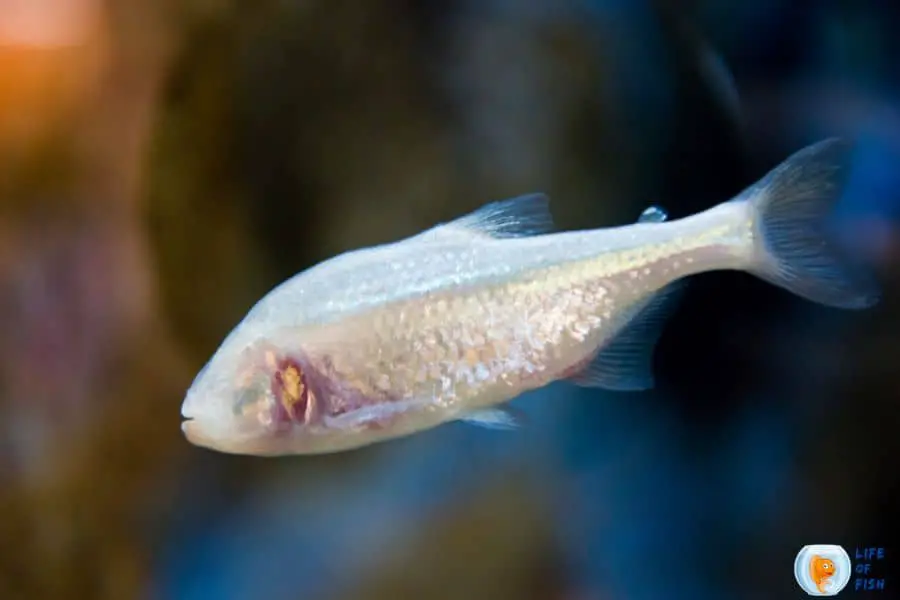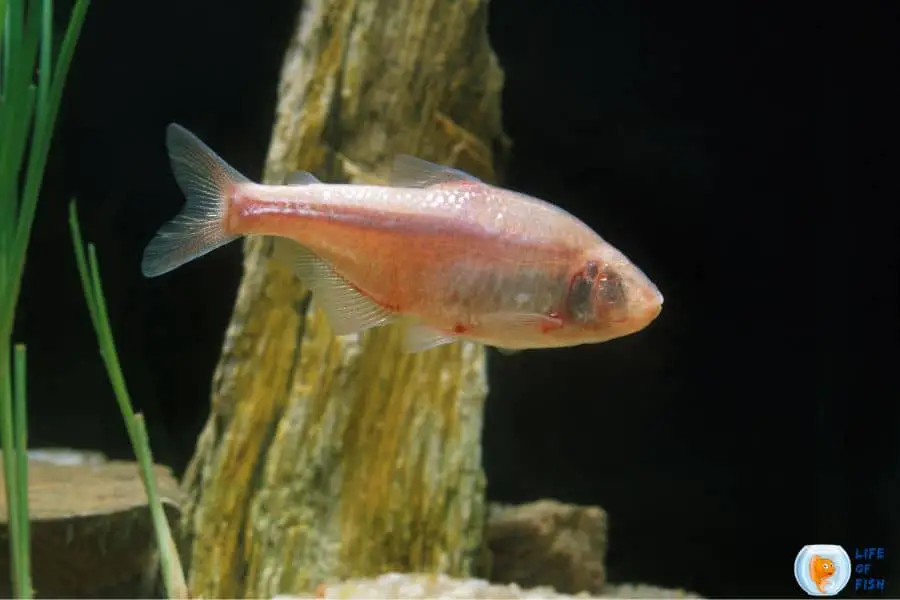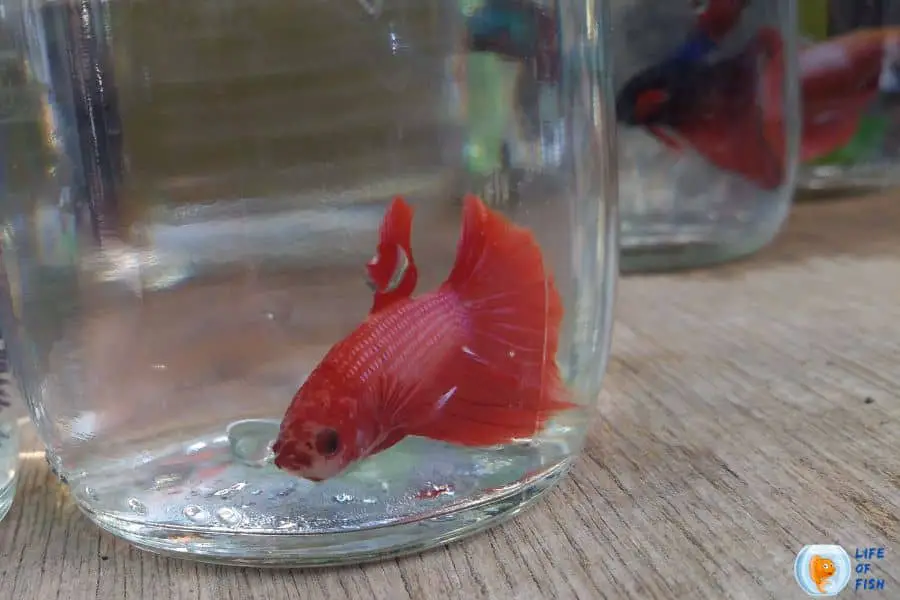When you see a fish that don’t act like normal and have an odd look in its eyes, you might wonder, “Is my fish blind?”. If you are an experienced aquarist, you know that there are fish that are born blind.
However, most fish have good eyesight. So, if your fish’s behaviors and appearance have changed, it is more likely due to another health issue, not blindness.
You can tell if your fish is blind by looking for certain characteristics. This article will discuss these symptoms and what you can do to help a blind fish.

Can My Fish Go Blind?
Yes. Fish can go blind if they get injured, suffer from a disease, or age.
Injuries that damage the eyes or the optic nerve can cause blindness. Common injuries include getting hit by gravel or decorations, scraped by the aquarium glass, or stung by another fish.
Diseases that can cause blindness include infections, tumors, and cataracts. Most common diseases include Exophthalmia (Pop Eye Disease) and Eye flukes.
However, these infections are often fatal to the fish. If your fish gets blind by one of these diseases, it is important to quarantine the fish and treat the entire aquarium.
As fish age, they can develop cloudiness in their eyes called nuclear sclerosis. This is a normal part of old age and causes no discomfort to the fish.
How Do I Know If My Fish Is Blind?
Several symptoms can indicate that your fish is blind.
Your fish bump into objects
If your fish is bumping into objects, this could be a sign that it is blind. Fish use their vision to navigate their environment, so they will have difficulty avoiding things if they can’t see.
Your fish doesn’t react to movement.
Another symptom of blindness is if your fish doesn’t react to movement. If you wave your hands in front of the tank and your fish doesn’t swim away, this could be a sign that it is blind.
Your fish swims erratically.
If your fish is swimming erratically, this could also be a sign of blindness. Fish that can’t see will have a hard time swimming in a straight line and may swim into objects.
Your fish has a hard time finding food.
If your fish is having a hard time finding food, this could be another symptom of blindness. Fish use their vision to find food, so they may have difficulty finding something to eat if they can’t see.
Your fish has cloudy eyes.
If your fish’s eyes are cloudy, this could be a sign of a disease that is causing blindness. You should take your sick fish to the vet to get it checked out.
Your fish has bulging eyes.
If your fish’s eyes are bulging, this could be a sign of a tumor or infection. You should take your sick fish to the vet to get it checked out.
Your fish has cataracts.
If your fish has cataracts, this is a sign of a disease that is causing blindness. You should take your sick fish to the vet to get it checked out.
What Does A Blind Fish Look Like
Most of the time, born blind fish look normal. Sometimes, fish are born without eyes. However, these fish do not survive for long.
If a fish goes blind later in life, there are several things you might notice. The fish may have cloudy eyes, bulging eyes, or cataracts. The fish may also bump into objects, swim erratically, or have a hard time finding food.
As they can not see, you may also notice several injuries on their body.
Can Fish Go Blind From Light?
Fish eyes are not like humans, where the pupils get small when there is too much light. They have fixed pupils that do not change size. So, generally, fish do not go blind to light.
However, too much light can still damage their eyes. Fish that are kept in tanks with bright lights can develop cataracts. So, it is essential to ensure your fish tank is not in a place with direct sunlight or bright artificial light.
You should also avoid using flashlights or other bright lights when looking at your fish tank. The light can be too intense for their eyes and can damage their vision.

Can A Blind Fish Survive?
Although eyes are the most critical sense for fish, they can still survive without them. Fish can rely on their other senses to navigate their environment and find food.
If your fish gets blind due to an infection or an injury, adjusting will take some time. However, most fish can adjust and will continue to live a normal life.
If you think your fish is blind, the best thing you can do is to take it to the vet. They will be able to identify the issue and advise you on how to care for your fish.
How To Care For A Blind Fish?
Caring for a blind fish is definitely a challenge for a fish keeper. However, it is not impossible. Here are some tips on how to care for a blind fish:
- Make sure your fish tank is in a place where there is no direct sunlight or bright artificial light.
- Though your fish is already blind, it may have a chance to cure. So, we should provide the best environment for it to have the chances of getting better. This includes providing the best water conditions, food, and tank mates. Make sure there are no obstacles in the fish tank. This will help your fish to move around safely.
- Use fine gravel or sand for the bottom of the tank. This will help your fish to avoid getting hurt.
- As your fish cannot see, it is more likely to get hurt. So, we should make sure the environment is safe for it. Avoid adding sharp decorations and equipment that can hurt your fish.
- Provide more hiding places in the fish tank for your fish. This will help your fish to feel more secure and less stressed.
- Since your fish is already blind, there is a chance that other fish may bully it. If other tank mates are bullying your fish, you may need to remove them from the tank.
- Make no unexpected movements or loud noises in the proximity of the tank. This will startle your fish and may cause it to injure itself.
- You should also avoid using flashlights or other bright lights when you are looking at your fish tank. The light can be too intense for their eyes and further damage their vision.
How To Feed A Blind Fish
In the wild, blind fish are at a severe disadvantage, as they are unable to see food or predators. As a result, they often starve to death or are eaten by other animals.
However, blind fish can thrive in an aquarium environment if given the proper care. Here are several suggestions on how to feed a blind fish successfully:
Keep the blind fish in a separate tank.
One way to ensure that your blind fish gets enough food is to place it in a separate tank from other fish. This will prevent larger fish from stealing their food and will also make it easier for you to monitor their eating habits.
Feed them easy-to-swallow food
Another important step is to choose the right type of food. Blind fish have difficulty finding and eating food, so it is important to choose a food that is easy for them to eat.
One option is to purchase pellets or flakes that are designed for bottom-feeding fish. These foods sink to the bottom of the tank, making them easy for blind fish to find and eat.
You may also soak dried food in water to soften it and make it easier for your fish to consume.
Try feeding them the food they are used to before going blind.
If your fish is blind from birth, it is used to eat a particular type of food. However, if your fish loses its vision later in life, then you may need to experiment with different types of food to see what they can eat.
For this, you can start with the food they are used to eating and then slowly introduce new foods to see what they are able to eat.
Use a feeding tube
If you have difficulty getting your blind fish to eat, you may need to use a feeding tube. A feeding tube is a small tube that is inserted into the fish’s mouth and used to deliver food directly to its stomach.
Feeding tubes are available at most pet stores. You can also use a dog/cat doser or a pipette to deliver the food to your fish.
Mix some garlic into the food
Another way to encourage feeding is to add garlic to the food. Since garlic has a strong scent, fish can easily find the food. In addition, garlic has many health benefits for fish, including reducing stress and boosting the immune system.
Further, garlic has been shown to stimulate a fish’s appetite and can make them more likely to eat. Simply add a small amount of garlic to the food before you feed it to your fish.
Be patient
It may take some time for your blind fish to learn how to eat. Be patient and keep offering food until your fish learns to eat on its own.
Blind fish require special care and attention. By following the tips outlined above, you can guarantee that your blind fish receives the nutrition it requires to grow.

Can Fish Eyes Grow Back?
According to a recent study, fish eyes can indeed regenerate. Scientists have long been fascinated by the ability of some animals to regenerate lost body parts, and the eyes are one of the most commonly studied organs.
In the past, researchers have identified several key genetic factors involved in eye regeneration in fish and amphibians. However, the particular mechanisms by which these factors operate have largely remained unknown.
The new study, conducted by a team of scientists, has shed light on this process by examining the role of a key genetic factor in the regeneration of fish eyes.
Interestingly, the researchers found that this gene, known as Atoh7, triggers two central steps in the regenerative process: cell division and the differentiation of progenitors into the different retinal cell types.
These findings suggest that Atoh7 plays a crucial role in directing the regeneration of fish eyes and that other genes involved in this process may also be more important regulators of tissue regeneration.
So, as you see, there is a high chance for a fish to grow its eyes back, given the right environment and care.
Conclusion
Fish being blind is an unfortunate event, but with the right care, they can still lead a happy and fulfilling life.
Be sure to give them the best food possible and be patient as they relearn how to eat. With a little love and care, your fish will be swimming around like it never lost its vision in the first place.
Read Next : Hospital Tank For Betta | Correct Setups |
Sharing is caring!

